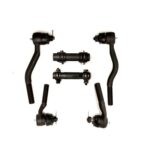When it comes to cars, enthusiasts and everyday owners alike often consider various options, from repairs to modifications and even dismantling for parts, known as “parting out.” But where does legal practice end and illegal activity begin? The line can blur, especially when discussing the concept of “chop shops.” Understanding the legal definitions and implications is crucial for anyone involved in the automotive world.
The term “chop shop” might sound like something out of an action movie, but it has a very real and specific legal definition, particularly in the context of vehicle dismantling. Federal law, under 18 U.S. Code § 2322, clearly defines a chop shop as any location where individuals are engaged in activities involving unlawfully obtained vehicles or vehicle parts. These activities include receiving, concealing, destroying, disassembling, dismantling, reassembling, or storing these vehicles or parts. The key purpose of these actions within a chop shop is to alter or remove the vehicle’s identity – primarily the Vehicle Identification Number (VIN) – in order to sell or dispose of the parts or the vehicle itself illegally.
California law mirrors this federal stance. California Vehicle Code 10801 VC also criminalizes knowingly owning or operating a chop shop. The definition is consistent: a chop shop is a place where someone knowingly alters, disassembles, or stores a stolen motor vehicle or parts with the intent to sell them, dispose of them, or hide their true identity.
The crucial point to understand is that the laws against chop shops are designed to target criminal activity – specifically, the handling and processing of stolen vehicles. Legally “parting out” a car that you legitimately own is not, in itself, illegal. The issue arises when the vehicles or parts are unlawfully obtained. Existing laws against chop shops are already in place to combat the illegal dismantling and sale of stolen vehicles. Therefore, new laws in this area might not necessarily target criminal operations more effectively but could potentially add further regulations to legitimate businesses and individuals involved in legal vehicle dismantling and the sale of used car parts. It’s a matter of ensuring that regulations target criminal behavior without unduly burdening legal and legitimate practices within the automotive industry.
